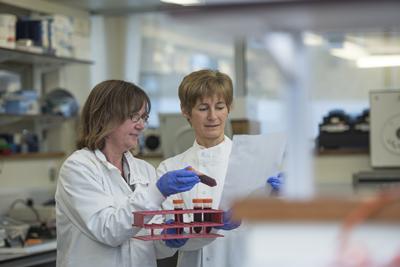World Cancer Day blog: Heading up oncology trials at the SCTU
.jpg_SIA_JPG_fit_to_width_INLINE.jpg)
Andrea Corkhill is the Head of Trial Management for the oncology group at the CRUK Southampton Clinical Trials Unit. She leads a team of trial managers and co-ordinators who help to design and deliver trials of potential new drugs and procedures with the aim of finding better, kinder treatments for cancer patients.
What does your role as Head of Trial Management for oncology involve?
I oversee all the cancer trials coming through the SCTU. I need to ensure that as a group we are committing our resources to the best research that will have the most impact on patient care. I am involved in the process of helping to decide which trials we can support, and my team and I are often also involved in the development of new trials. I’m the point of contact for any complex issues that may come up, always ensuring that we work safely and in adherence to clinical trial regulations. I also maintain links with other clinical trials units across the country to ensure national collaboration and share best practice.
Are there any particular cancer trials or areas of research that excite you at the moment?
What excites me the most is the way trials and trial designs are constantly evolving. Trial designs are becoming more streamlined and adaptive; multi-arm, multi-stage (MAMS) and platform designs, where several potential treatments can be looked at within different arms of the same trial, allow multiple research questions to be answered within one trial design. The delivery is very different from ‘standard’ designs and can therefore be very demanding on the trial teams or require additional resources. Being able to learn new things within an environment I have worked in for a very long time is challenging, but incredibly exciting.

How important is it for the SCTU to be based within the University of Southampton's Centre for Cancer Immunology (CCI) and on the Southampton General Hospital site?
Although we are an International CTU and work with people from all across the UK and abroad, the direct proximity to Southampton-based clinicians and researchers enables us to have close working relationships locally. In particular, SCTU has a large portfolio of immunotherapy trials and we are able to work closely with other staff located in the CCI to develop new trials in this exciting field.
Most cancer trials now also include translational aspects, where samples such as blood or tumour biopsies are taken from patients and can extend the information gained from clinical trials. This could be how or why some treatments work better than others, or for some patients only. Southampton has a fantastic infrastructure for laboratory capabilities and expertise, and we make full use of this.
A large number of SCTU trials are sponsored by University Hospital Southampton NHS Foundation Trust (UHS). Working on the hospital site means SCTU and UHS staff to meet regularly and easily to discuss their portfolio and trial issues.
If it wasn’t for the patients who consent to participate in research, clinical trials could not happen, and cancer treatments would not be able to advance, so they really are integral to everything we do.

How has the COVID-19 pandemic affected the SCTU and the cancer trials you run?
The pandemic has certainly affected my role and clinical trials as a whole. At the beginning of 2020, as with so many other organisations, we wanted to contribute to the response and extended into COVID-19 research, to help advance clinical knowledge and patient care. These COVID-19 trials continue, but we have also been working continuously to lessen the impact on cancer trials and cancer patients.
During the first wave, hospitals had to move staff resource to cover COVID care, so recruitment into clinical trials was paused, though if patients were already in trials, their treatment could often continue. As the pandemic progressed, hospitals worked hard to return to normal as quickly as they could, and cancer trials re-opened to recruitment. But delivery has slowed, and opening of new hospitals to existing trials, or opening new trials has been delayed in some cases.
The other impact has been a reduction in new trials gaining funding. Funders such as Cancer Research UK have seen their fundraising income dramatically reduced, and this has had a knock-on effect on how many trials they can support. Trial outputs will similarly be delayed for some trials due to COVID-19, but our staff and the hospitals we work with are highly committed to delivering cancer trials as quickly and efficiently as possible to enable patients to participate in trials safely, and research outcomes to continue to be delivered.
What has been your proudest moment as head of cancer trials in recent years?
I think recently it has to be the way my team have responded to the pressures of the COVID-19 pandemic. Workload has significantly increased, but the trial management team continue to deliver not only oncology trials, but also to extend into COVID-19. I am incredibly proud of how the trial management team embraced and adapted to these challenges. The team have been hugely supportive to each other and have remained highly committed to ensuring oncology trials are delivered safely and effectively.
What would you say to the patients who consent to take part in clinical trials?
Working in oncology, all our patients are cancer patients and are often under a huge amount of emotional strain from a cancer diagnosis or relapse. I have huge respect for the patients and their families who need to consider all the complex information given to them about their medical condition and the treatment options, including clinical trial involvement. Participation in clinical trials is always optional and we strive to design trials to minimise burden for patients as much as possible. We include patients or family members who have experience of cancer in trial oversight groups to ensure the patient and public voice is always included.
If it wasn’t for the patients who consent to participate in research, clinical trials could not happen, and cancer treatments would not be able to advance, so they really are integral to everything we do.